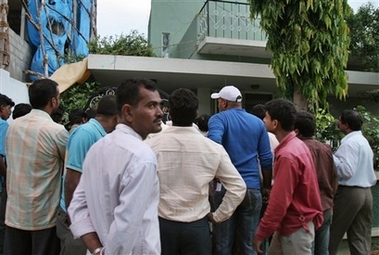British look for links in failed plot
(AP)Updated: 2007-07-06 08:48
GLASGOW, Scotland - When two doctors crashed a Jeep Cherokee into Glasgow's Airport and then set it on fire in a desperate attempt to ignite crude bombs it was clear to a policeman on the scene that they were on a suicide mission.
 People crowd outside the house of Sabeel Ahmed, an Indian doctor in Bangalore, India, Thursday, July 5, 2007. [AP]  |
"They both appeared very calm and collected, very assured of themselves," Campbell said Thursday on Sky TV. "They had nothing else to do - it was as if they were waiting there to get blown up."
Baggage handler John Smeaton jumped into the fray, helping police grappling with the suspects. "I got a kick in," he told The Guardian newspaper. "Other passengers were getting kicks in. The flames were going in two directions."
The eight suspects arrested in Saturday's airport attack and two failed car bombings a day earlier in London were all foreigners working for Britain's state health system, and investigators are pressing to find what brought them together. They also are looking for links between the six Middle Eastern suspects and two Indian nationals arrested in the case.
Police have refused to release "operational details" of the case. But the investigation would now be at the analysis stage, said Bob Ayers, a former US intelligence officer now at Chatham House, an international affairs think tank in London.
"They've got all the evidence they're ever going to have. There may still information coming in, but it will be based on what they've already got, like DNA from the cars," Ayers said.
Using cell phones recovered from two Mercedes sedans loaded with gasoline and propane tanks in London and other telephone records, authorities are building up a "link analysis" of what calls were made, Ayers said.
"They're recreating the network of all the people involved and building that network using cell phone records, computer records, DNA, fingerprints - anything that will establish who was communicating with whom," he said.
At least five of those in custody appear to have some link to Glasgow's Royal Alexandra Hospital.
Ahmed, identified by staff at the hospital as Lebanese physician employed there, is now being treated at the facility for horrific burns suffered when he set himself on fire after crashing the Jeep loaded with rudimentary bombs into the airport's main terminal Saturday.
Abdulla, a passenger in the Jeep, is an Iraqi doctor employed by Royal Alexandra, and a doctor there has said a Jordanian physician held in the case had an office at the hospital.
Two other suspects, men aged 25 and 28 whose identities have not been revealed, were arrested at the hospital's residences. Staff described them as a junior doctor and a medical student.
On Thursday, police were still examining a Glasgow house rented by Abdulla, which a British security official said authorities believed was the site where the plotters made the bombs used in both the London and the airport attacks.
Neighbor Susan Hay told The Associated Press that police said they were "stripping" the home Thursday morning to look for fingerprints and other forensic materials. A large tent - set up Sunday - screened the garage.
Police have refused to identify which suspects lived in the house, but Denis O'Donnell of the local Paisley Cab Company, said his taxis had picked up Abdulla at the house frequently.
"We picked him up between 18 to 19 times since about May 20, mostly to the hospital but once to the airport," O'Donnell told AP.
Brian Harvey, a 60-year-old construction worker who lives on the street, said he had seen a green Jeep Cherokee parked outside the home. "It seemed unusual, strange over here," Harvey said, explaining that most other vehicles on the street were more modest.
Abdulla is believed to have known suspect Mohammed Asha, when Asha worked at Addenbrooke's Hospital in Cambridge, where Abdulla has relatives.
Abdulla visited Cambridge as recently as three weeks ago, and was there regularly to visit an uncle and his grandmother, said a cafe owner who once rented Abdulla an apartment in the eastern city. He agreed to talk about Abdulla only if his name wasn't used, to avoid damaging his relations with the suspect's family.
Shiraz Maher, a former member of a radical Islamic group, said earlier this
week that he knew Abdulla at Cambridge University and described the suspect as a
hard-line Muslim.
| 1 | 2 |  |
|
|
|
||
|
||
|
|